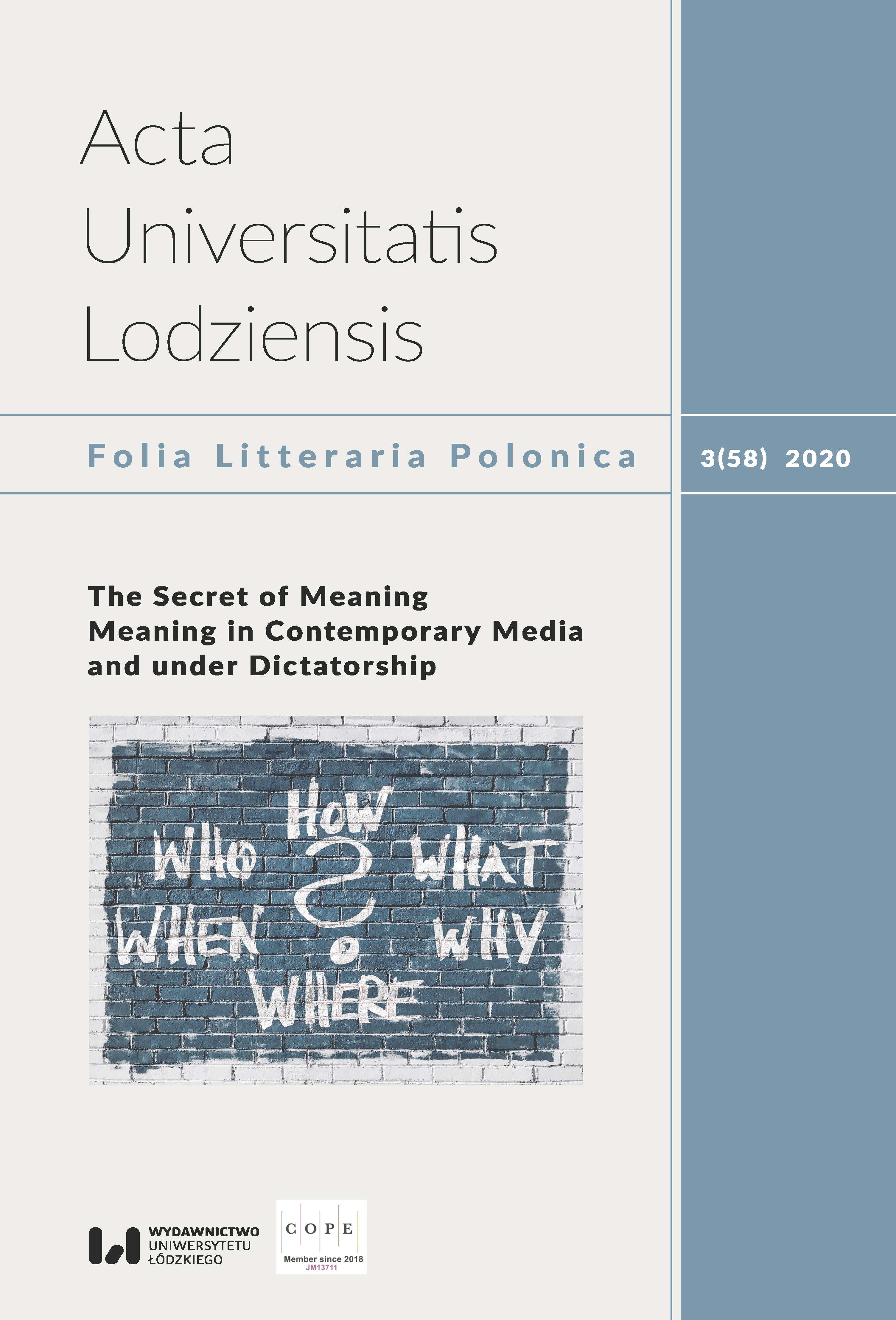Contemporary communication and ratiomorphization of meaning
DOI:
https://doi.org/10.18778/1505-9057.58.04Keywords:
social communication, modern media technology, epistemology of communication, ratiomorphism, meaning, axiologyAbstract
In the article, I attempted to indicate that in modern communication, i.e. also in social life, ratiomorphism has been appearing. I define it as an unconscious, innate, genetically determined and teleonomically survival-driven cognitive faculties, skills and patterns of behavior present in all living being, including humans.
It cannot be, however, associated only with emotions or irrationalism. In modern communication dominated by the new media, ratiomorphism takes on the form of technoratiomorphism. Therefore, it is obvious that ratiomorphism also appears in the sphere of meaning.
In the pre-internet era, meaning was associated with rationality and universal values such as truth, goodness, and beauty. In the internet era, there has been a turn towards ratiomorphic values: truth is being replaced with acceptance, goodness with utility, and beauty with attractiveness.
Paradoxically, than new strategy for finding and creating meaning is a rational strategy in the contemporary communicational environment.
Downloads
References
Bendyk Edwin, “Krytyka rozumu cyfrowego”, Przegląd Polityczny 2018, issue 149, pp. 12–30.
Google Scholar
Costa da Newton C.A., French Steven, Science and Partial Truth, Oxford University Press, Oxford 2003, pp. 8–20, https://doi.org/10.1093/019515651X.003.0002
Google Scholar
DOI: https://doi.org/10.1093/019515651X.003.0002
Czaja Dariusz, “Żarliwość i melancholia. Dylematy humanisty”, Przegląd Polityczny 2018, issue 151/152, pp. 2–14.
Google Scholar
Danto Arthur C., Czym jest sztuka, trans. A. Kunicka, Wydawnictwo Aletheia, Warsaw 2016.
Google Scholar
Doyal Len, Gough Ian, A Theory of Human Need, The Guilford Press, New York 1991, https://doi.org/10.1007/978-1-349-21500-3
Google Scholar
DOI: https://doi.org/10.1007/978-1-349-21500-3
Fiut Ignacy S., Urbaniak Marcin, Wiedza w perspektywie ewolucyjnej, Wydawnictwo Aureus, Krakow 2017.
Google Scholar
Hajduk Zygmunt, Nauka a wartości, Towarzystwo Naukowe KUL, Lublin 2008.
Google Scholar
Hostyński Lesław, Wartości utylitarne, Wydawnictwo Uniwersytetu Marii Curie-Skłodowskiej, Lublin 1998.
Google Scholar
Hudzik Jan P., Wykłady z filozofii mediów. Podstawy nauk o komunikowaniu, Wydawnictwo Naukowe PWN, Warsaw 2017.
Google Scholar
Kreft Jan, “Władza algorytmów mediów – między reifikacją a rynkiem”, Zarządzanie w Kulturze 2018, issue 19, pp. 11–28, https://doi.org/10.4467/20843976ZK.18.002.8494
Google Scholar
DOI: https://doi.org/10.4467/20843976ZK.18.002.8494
Krzysztofek Kazimierz, “Wrażliwość zapisana w algorytmach? Między technomorfizacją człowieka a antropomorfizacją maszyny”, Kultura Współczesna 2018, issue 4, pp. 24–40.
Google Scholar
Lemańska Anna, “Matematyczność czy matematyzowalność przyrody”, Studia Philosophiae Christianae 2013, issue 3(49), pp. 5–24.
Google Scholar
Lorenz Konrad, “Kants Lehre vom Apriorischen im Lichte gegenwärtiger Biologie”, [in:] K. Lorenz, F.M. Wuketits, Die Evolution des Denkes, Piper Verlag, München–Zurich 1983, pp. 95–124.
Google Scholar
Lorenz Konrad, Regres człowieczeństwa, trans. A.D. Tauszyńska, PIW, Warsaw 1986.
Google Scholar
Lorenz Konrad, Tak zwane zło, trans. Z. Stromenger, PIW, Warsaw 1996 (original edition 1963).
Google Scholar
Markowski Michał P., “Cioran. Portret fanatyka”, Przegląd Polityczny 2018, issue 150, pp. 115–159.
Google Scholar
Napiórkowski Marcin, Mitologia współczesna, Wydawnictwo Naukowe PWN, Warsaw 2018.
Google Scholar
Nowak Jakub, Polityki sieciowej popkultury, Wydawnictwo Uniwersytetu Marii Curie-Skłodowskiej, Lublin 2017.
Google Scholar
Pinker Steven, Nowe Oświecenie. Argumenty za rozumem, nauką, humanizmem i postępem, trans. T. Bieroń, Zysk i S-ka, Poznań 2018.
Google Scholar
Plato, Plato in twelve Volumes, vol. 9, trans. H.N. Fowler, Cambridge, MA, Harvard University Press, William Heineman Ltd., London, 1925.
Google Scholar
Platon, Fajdros, trans. L. Regner, Wydawnictwo Naukowe PWN, Warsaw 2004.
Google Scholar
Platon, Fajdros, trans. W. Witwicki, Państwowe Wydawnictwo Naukowe, Warsaw 1958.
Google Scholar
Pleszczyński Jan, Epistemologia komunikacji medialnej. Perspektywa ewolucyjna, Wydawnictwo Uniwersytetu Marii Curie-Skłodowskiej, Lublin 2013.
Google Scholar
Pleszczyński Jan, “Komunikacja: natura i kultura”, Roczniki Filozoficzne 2011, issue 2(59), pp. 255–274.
Google Scholar
Pleszczyński Jan, “Maska i anonimowość jako problem komunikacji”, [in:] Literatura. Media. Polityka, ed. M. Piechota, Wydawnictwo Uniwersytetu Marii Curie-Skłodowskiej, Lublin 2014, pp. 107–122.
Google Scholar
Pleszczyński Jan, “O tożsamościach komunikacyjnych, intersubiektywności i przymusie komunikowania się”, [in:] Komunikatywizm – przyszłość nauki XXI wieku, ed. G. Habrajska, Wydawnictwo Primum Verbum, Łódź 2016, pp. 18–34.
Google Scholar
Popper Karl R., Eccles John C., The Self and Its Brain, Routledge & Kegan Paul, London and New York 1983.
Google Scholar
Safranski Rüdiger, Schopenhauer. Dzikie czasy filozofii, trans. M. Falkowski, Wydawnictwo Prószyński i S-ka, Warsaw 2008.
Google Scholar
Sokal Alan, Bricmont Jean, Modne bzdury. O nadużywaniu pojęć z zakresu nauk ścisłych przez postmodernistycznych intelektualistów, trans. P. Amsterdamski, Wydawnictwo Prószyński i S-ka, Warsaw 2004.
Google Scholar
Stróżewski Władysław, Istnienie i sens, Wydawnictwo Znak, Krakow 1994.
Google Scholar
Stróżewski Władysław, Istnienie i wartość, Wydawnictwo Znak, Krakow 1981.
Google Scholar
Świat musi mieć sens. Przerwana rozmowa arcybiskupa Józefa Życińskiego i Aleksandry Klich, Agora, Warsaw 2012.
Google Scholar
Wendland Michał, Filozoficzne i metodologiczne podstawy historii komunikacji, Wydawnictwo Naukowe Uniwersytetu Adama Mickiewicza, Poznań 2014.
Google Scholar
White Hayden, “Posthumanizm a wyzwolenie ludzkości”, trans. A. Czarnacka, [in:] Hayden White, Przeszłość praktyczna, ed. E. Domańska, trans. J. Burzyński, A. Czarnacka, T. Dobrogoszcz, E. Domańska, E. Kledzik, A. Ostolski, P, Stachura, E. Wilczyńska, Ł. Zaremba, Wydawnictwo Universitas, Krakow 2014, pp. 267–273.
Google Scholar
Wilson Edward, O naturze ludzkiej, trans. B. Szacka, Państwowy Instytut Wydawniczy, Warsaw 1988.
Google Scholar
Życiński Józef, Granice racjonalności, Państwowe Wydawnictwo Naukowe, Warsaw 1993.
Google Scholar
Życiński Józef, Struktura rewolucji metanaukowej. Studium rozwoju współczesnej nauki, trans. M. Furman, Copernicus Center Press, Krakow 2013.
Google Scholar
Downloads
Published
How to Cite
Issue
Section
License

This work is licensed under a Creative Commons Attribution-NonCommercial-NoDerivatives 4.0 International License.











